Money in Politics: Americans’ Views on Campaign Finance Reform
5/3/2016
While few Americans feel they know much about fixing the way political campaigns are funded, there is considerable agreement that elected officials are influenced by special interests and efforts should be made to rein in the power of money on campaigns.
There is bipartisan support for limiting campaign donations and expanding disclosure. Only about a third of those surveyed support unlimited financing of public action committees.
The Fishlinger Center for Public Policy Research at the University of Mount Saint Vincent seeks to foster meaningful dialog on key public policy issues through independent, objective public opinion research. The national surveys of 2016 will focus on political issues in the United States ahead of the Presidential election in November.
The fieldwork was conducted online by IPSOS Public Affairs January 14-22, 2016 with 1,251 adults nationwide.
Importance of Campaign Funding
Nearly half of the public consider campaign finance reform to be extremely or very important. However, Americans give higher priority to several other issues related to elections. The truthfulness of candidates is important to two-thirds. Both accurate polling and voter turnout is important to nearly 6 in 10. Unbiased news reporting is important to just over half.
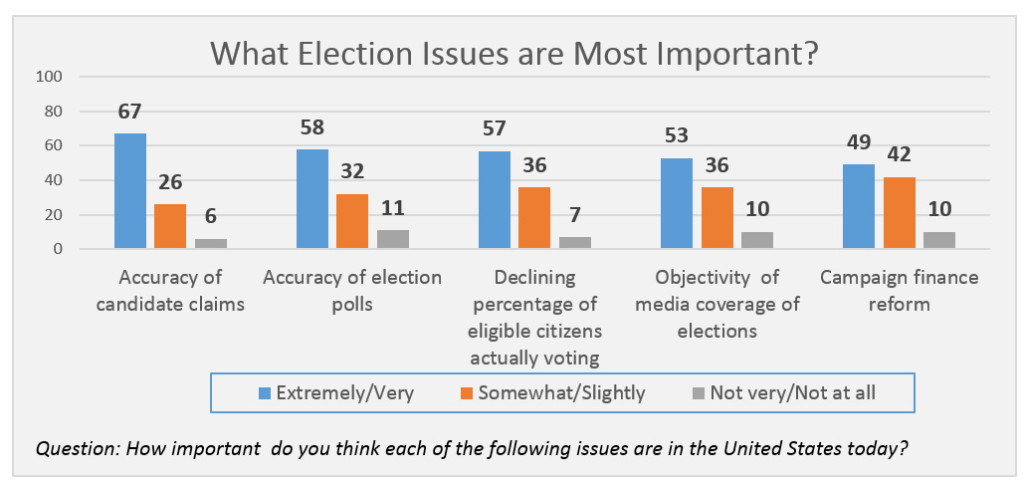 While nearly half of the public says campaign finance reform is an important issue, only about a third say the source of a candidate’s funding to very or extremely important in their vote decision.
While nearly half of the public says campaign finance reform is an important issue, only about a third say the source of a candidate’s funding to very or extremely important in their vote decision.
Not surprisingly, voters who plan to participate in the general election are more inclined to be paying attention to these issues. For example, 27 percent of those who expect to vote for president in November are have heard or read extensively or quite a bit about campaign finance reform. Only 12 percent of those who are not planning to vote in November are paying the same amount of attention.
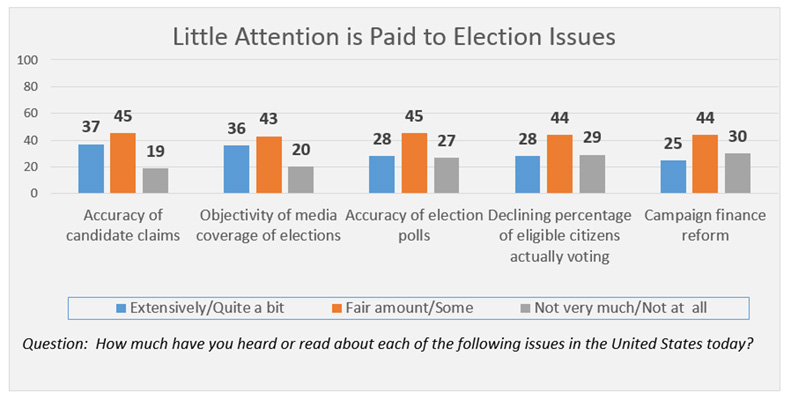 The source of candidates’ campaign funds is not a particularly big factor in whether the public supports them. Americans are most concerned with a candidate’s opinions and personal characteristics.
The source of candidates’ campaign funds is not a particularly big factor in whether the public supports them. Americans are most concerned with a candidate’s opinions and personal characteristics.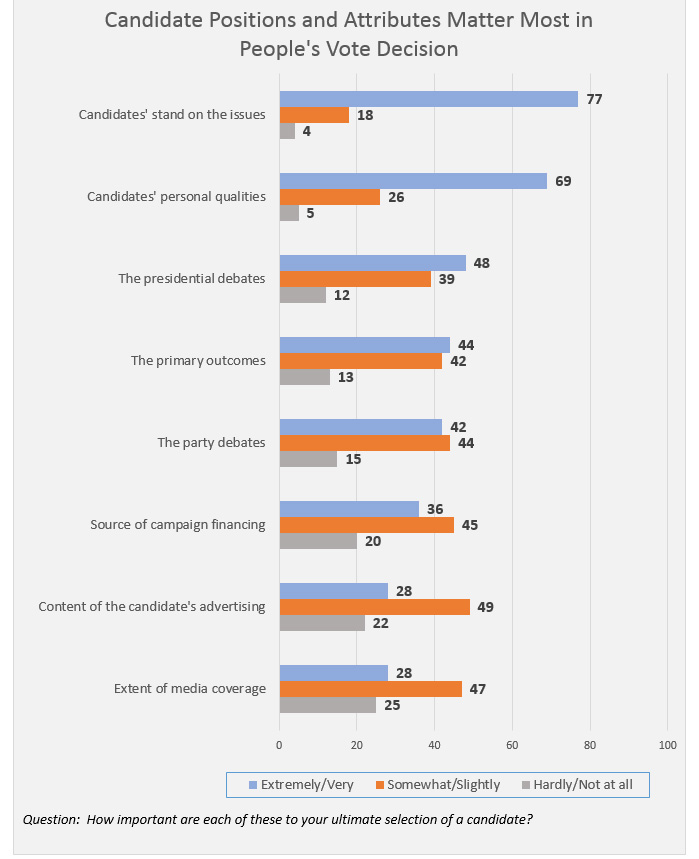
Campaign Finance and Special Interests
There have been efforts to reduce the role of money in American elections for over a century, at least. In his 1907 State of the Union message, President Theodore Roosevelt recommended public financing of federal elections and a ban on private contributions.
More recently, the Bipartisan Campaign Reform Act of 2002, often referred to by the names of its sponsors, Republican Sen. John McCain of Arizona and former Sen. Russell Feingold of Wisconsin, limited the use of corporate and union money to fund advertising on political issues. It was struck down by the Supreme Court on constitutional grounds in 2010 in the Citizens United v. Federal Election Commission decision.
And in 2014, a decision by the Supreme Court struck down the decades-old limit on the total amount any individual can donate to federal candidates in a two-year cycle.
Supreme Court decisions notwithstanding, there is much support among the public for some proposals to reduce the power of money on elections in the United States.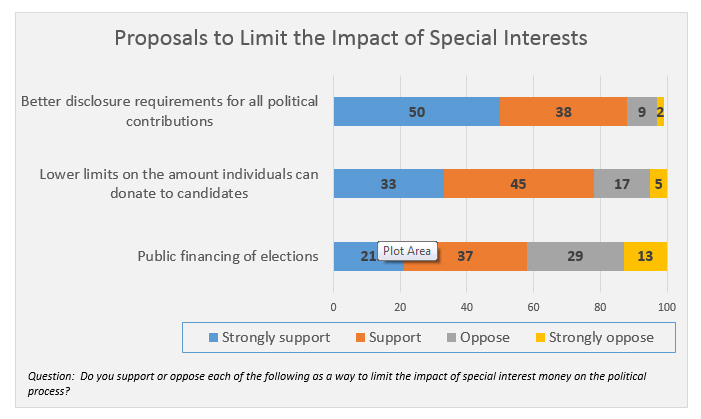
In order to limit the influence of special interests, a large percentage of the public would support increasing the requirement to disclose political contributions (88 percent) and reducing the amount an individual could donate to a candidate (78 percent). Less support, but still a majority, is given to the idea of using taxpayer funding of elections (58 percent).
Political Action Committees
A political action committee, or PAC, pools campaign contributions and then donates funds to campaign for or against a candidate, ballot initiative, or legislation. One type of PAC known as a Super PAC may not make contributions directly to a candidate or political party, but can spend unlimited funds independently. Unlike traditional PACs, there is no limit on the size of donations to Super PACs. And much of the funding for Super PACs from corporations is legally protected from public disclosure.
Under the Supreme Court’s Citizens United decision, political spending is protected under the First Amendment, meaning corporations and unions could spend unlimited amounts of money on political activities, as long as it was done independently of a party or candidate.
Most Americans would support legislation to restore limits on campaign spending by corporations or unions. And there is little support for unlimited spending by Super PACs.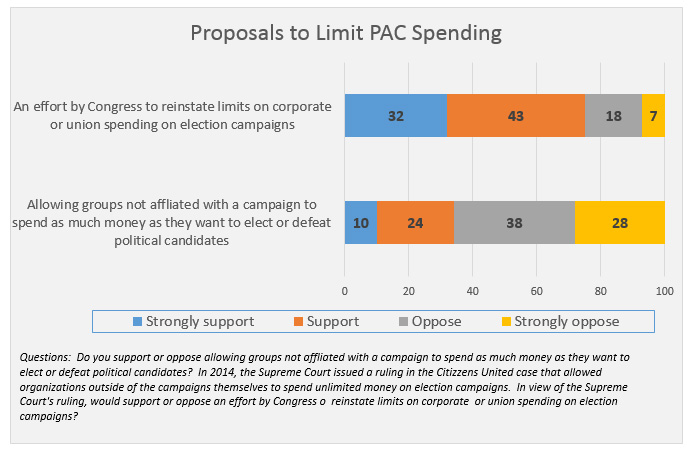
Antipathy toward Washington Officials
The substantial majority of Americans disapprove of the job Congress is doing. In fact Congress’ approval rating has not exceeded 20 percent in the Gallup Poll since October 2012.
Although Democrats and Republicans tend to have sharply different views on just about every subject, they are just about equally disappointed the elected representatives in Washington. Overwhelmingly, Republicans and Democrats alike regard elected officials as influenced by special interests, out of touch, too partisan and self-centered.
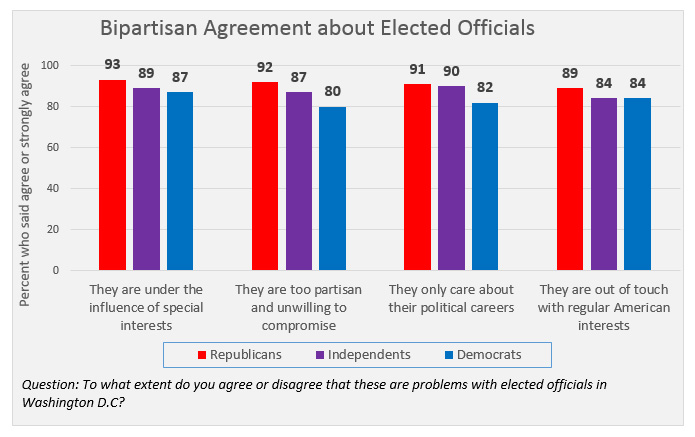 Partisan Differences
Partisan Differences
Campaign finance reform also appears to be an issue on which there is widespread agreement across the political divide.
There is little difference, regardless of party identification, in the public’s opposition to unlimited spending by super PACs or support for a Congressional effort to reverse the corporate and union spending provisions of the Citizens United judgement.
One topic where partisan differences are noted is public financing of campaigns. Just about half of Republicans (54 percent) and independents (50 percent) favor public funding of elections to reduce the influence of special interests on politicians. There is more support among Democrats, 69 percent of whom would like to see campaigns underwritten by the taxpayers.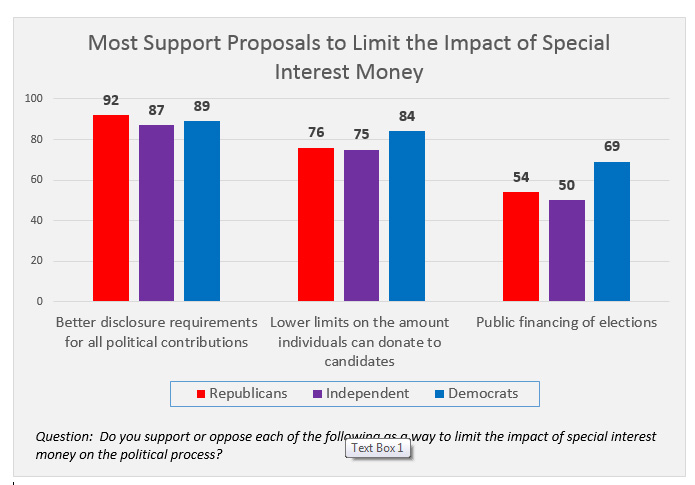
Survey Methodology
The fieldwork for the Fishlinger Center poll was conducted by Ipsos Public Affairs. Online interviews with 1,251 adults were collected January 14-22, 2016. Sampling for the survey used a blended approach, combining the Ipsos iSay panel with Ampario sample (a blend of external panel and non-panel sources). Ipsos measures the precision of its online surveys using a credibility interval to measure sampling error. The survey of 1,251 respondents has a credibility interval of plus or minus 2.8 percentage points; plus or minus 3.o for the 1,096 respondents who said they plan to vote in November. The credibility interval may be larger for other subgroups. The poll is subject to other potential sources of error, including, but not limited to coverage and measurement error. Data were weighted to match the national population on age, sex, Hispanic origin and race.
About the Fishlinger Center for Public Policy
The Fishlinger Center for Public Policy Research opened in February 2015 at the University of Mount Saint Vincent. The Center, a member of the American Association for Public Opinion Research (AAPOR), conducts deep and broad studies of public opinion on key public policy concerns through independent and objective research conducted by students, faculty, and other members of the academic community.
By providing a forum for discourse that can stimulate intelligent dialog about issues that deeply affect all Americans, the Center illustrates and enhances the relationship between the work of the College and the common good.
About the University of Mount Saint Vincent
Founded in 1847 by the Sisters of Charity, the University of Mount Saint Vincent offers nationally recognized liberal arts education and a select array of professional fields of study on a landmark campus overlooking the Hudson River. Committed to the education of the whole person, and enriched by the unparalleled cultural, educational and career opportunities of New York City, the College equips students with the knowledge, skills and experiences necessary for lives of achievement, professional accomplishment and leadership in the 21st century.
